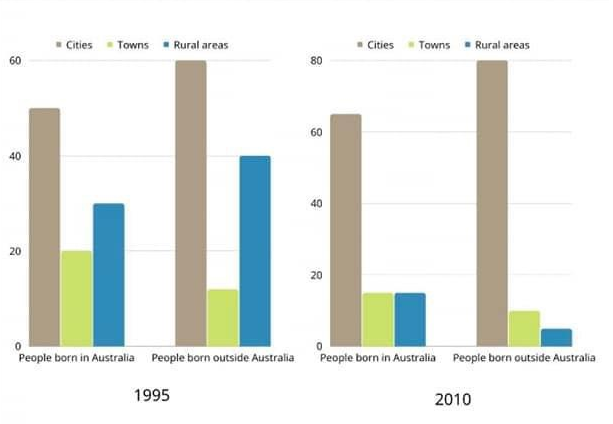[Jessica O] Writing Practice Test 983706
Task 1
You should spend about 20 minutes on this task.
The bar chart below describes some changes about the percentage of people were born in Australia and who were born outside Australia living in urban, rural and town between 1995 and 2010.
Summarise the information by selecting and reporting the main features and make comparisons where relevant.
You should write at least 150 words.

The percentage of people who were born inside and outside Australia which is divided in people who live in cities, towns, and rural areas between 1995 and 2010 was shown in the bar chart.
In general, the percentage of people who born in cities both in Australia and outside Australia were the highest, even in 1995 and 2010.
In 1995, people who born in cities outside Australia was the highest, that can reach 60%. In addition, people who born in cities inside Australia was the second, about 50%. In the third, people who born in rural areas outside Australia (40%), and in fourth place was who born inside Australia (about 30%). Besides, people who born in towns in Australia (20%) was higher than people who born in towns outside Australia (about 10%).
In 2010, people born in cities was still in the same place, both who born outside Australia and inside Australia. But the percentage was increase to 80% (outside Australia) and to about 65% (inside Australia). Surprisingly, there was not the same for the others. The percentage about people who born in towns and rural areas in Australia were the same, about 18%. People who born in towns outside Australia was lower than before, about 15%. Lastly, people who born in rural areas outside Australia was the lowest, about 10% only.
Task 2
You should spend about 40 minutes on this task.
Rich countries often give money to poorer countries, but it does not solve poverty. Therefore, developed countries should give other types of help to the poor countries rather than financial aid. To what extent do you agree or disagree?
You should write at least 250 words.
Nowadays, many poor countries are given the money by richer countries. But that not solve any poverty problems. Some people said that the types of help from develop countries to poor countries should be different from financial aid. In my opinion, I agree with that statement, because there are so many things that could help solve poverty.
Some countries are poor because of many things. The systems in their government, that not want to make their people moving forward are one of the possibly things to make it happen. People who work in the government are only think about themselves. They just want to make themselves popular and rich, instead of think their communities. They do the illegal things, such as corruption. Therefore, the money that should be spent to build the country to becomes better, has been eaten by the irresponsible corruptors.
All the countries in the world should altogether side by side to solve the poverty problems. The rich countries not only give money to the poorer countries, but they could help in other things, such as give their educational personnel to the poorer countries. Young people in poor countries can have better education, where in the future, these people who take over the government. They must be equipped by well education, so that they can give contribution and make their country better than before, even make it become rich country.
In conclusion, there are so many things that could make a country become poor, such as corruption. Therefore, rich countries can help poor countries with send some educational personnel. This action is to make young people in poor countries more educated, so that they can lead their countries better and make their countries richer than before.
Community’s feedback
Sorry! We couldn't find any contents.
Leaderboard:
| # | User | Score | Time | |
|---|---|---|---|---|
| Kento Nanami |  | 8.5 | 52:31 | |
| Nayef Alhajraf |  | 8.5 | 60:00 | |
| Ella Ruppo |  | 7.5 | 59:39 | |
| 4 | chengxi yu |  | 7.0 | 00:00 |
| 5 | avin chui |  | 7.0 | 59:11 |
| 6 | 癫 火 |  | 7.0 | 59:51 |
| 7 | Li Xuefeng |  | 6.5 | 03:46 |
| 8 | Chanisara Wongkongsang |  | 6.5 | 56:37 |
| 9 | Dan H |  | 6.0 | 50:41 |
| 10 | Carlo Di Giacomo |  | 6.0 | 60:00 |



